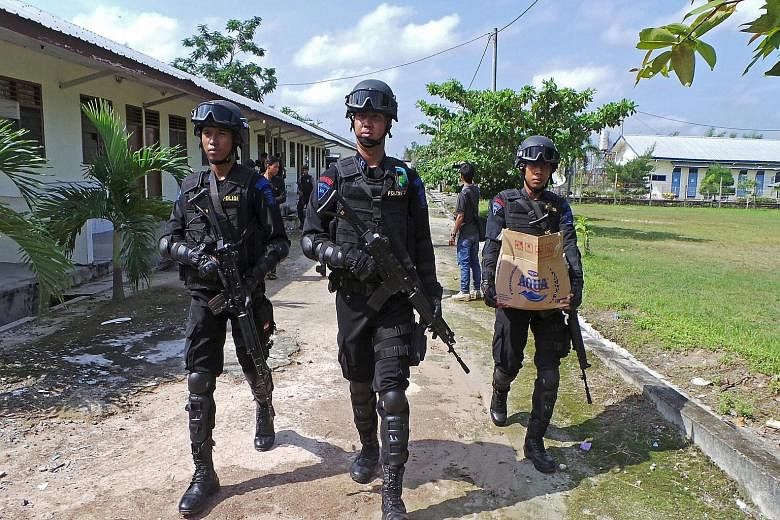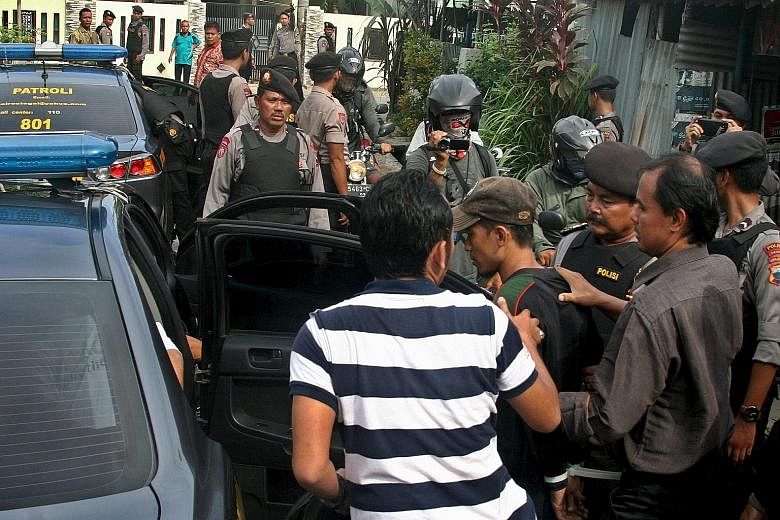Indonesia is tightening its borders while widening its manhunt for citizens loyal to the Islamic State in Iraq and Syria (ISIS), following Thursday's terror attack in Jakarta.
Overnight raids by the elite counter-terrorism unit Detachment 88 (Densus 88) saw nine more arrests, taking the total number of suspects nabbed in connection to the attack to 12, said Indonesian police chief Badrodin Haiti yesterday.
All 12 are known associates of Indonesian ISIS loyalist Muhammad Bahrun Naim, the alleged mastermind of the violence.
They were also plotting more attacks, he said. Three of the men were picked up during a pre-dawn raid on Friday.
Among the items seized in the raids across Java and in East Kalimantan are nine revolvers, six ammo magazines, five mobile phones and a motorbike, along with plans detailing future attacks.
Police spokesman Inspector-General Anton Charliyan said the 12 suspects were targeting "Western symbols such as Europeans and Americans to prove their existence".
"The call from ISIS leader (Abu Bakr al-Baghdadi) was to launch attacks overseas," he added.
As investigations continue, citizens returning from the Middle East after joining ISIS will be denied entry by immigration officers, warned General Badrodin.
The police have shared with the country's immigration authorities a list of names of suspected militants believed to have left Indonesia to fight or train with ISIS.
The latest move is part of a wider strategy to prevent a repeat of Thursday's brazen attack in the heart of the city, which left seven dead, including the five perpetrators, and more than 25 injured.
One of the victims remains in a vegetative state, said Gen Badrodin, adding that the Indonesian man, who works as a security guard at Bangkok Bank, located not far from ground zero of the siege, had suffered a gunshot wound to the head.
Two of the four foreigners injured are set to be airlifted to Singapore for treatment, according to Colonel Musyafak, head of the police health and medical department.
He said the families of Dutchman Yohanes Antonius Maria, 52, and a 44-year-old Austrian, Mr Marek, had arranged for their transfer from Gatot Subroto Army Hospital in Central Jakarta to Singapore, with the assistance of their respective embassies.
Mr Maria is expected to leave Jakarta by today, while no date has been fixed for Mr Marek's transfer.
The police also released the names of the five Indonesian suspected militants, four of whom were killed by their own bombs while one was gunned down by police officers. The five were Sugito, 42; Dian Joni Kurniadi, 25; Ahmad Muhazin, 25; Muhammad Ali, 39; and Sunakim alias Afif.
"The identification was based on a scientific (DNA) process and thorough investigation by Densus 88," said Gen Badrodin.
The police have not determined Sunakim's age, but confirmed that he and Muhammad Ali had both been convicted of taking part in terror-related activities in the past.
Photos of Sunakim - who was wearing a baseball cap, T-shirt and jeans - shooting into the crowd and gunning down policemen on the Thamrin boulevard are among the defining images of the attack that has stunned Indonesians.
Police previously said Sunakim had served time in 2010 for receiving weapons training at a paramilitary camp in Aceh province. The camp, set up by militant cleric Abu Bakar Bashir, was shut down after it was raided by police.
Gen Badrodin also confirmed that the unexploded bombs left behind by the five militants on Thursday were graded as "low explosives" while the firearms used were made in the Philippines. But he said it was unclear how the attackers acquired them.
Meanwhile, more details have emerged about the involvement of alleged mastermind Bahrun. Police said the attackers had received funds traced to Syria, Bahrun's last known location and a stronghold of ISIS. According to Gen Badrodin, there were a number of fund transfers of "40 million rupiah to 70 million rupiah" (S$4,200 to S$7,200) from Bahrun to at least one of the five attackers via Western Union since last year.
He added: "We do not know if it is Bahrun Naim's personal money or the organisation's money but the fact is the funds came from Bahrun Naim."


